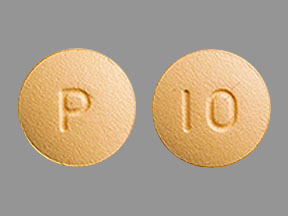Prasugrel Dosage
Medically reviewed by Drugs.com. Last updated on May 30, 2025.
Applies to the following strengths: 10 mg; 5 mg
Usual Adult Dose for:
Usual Geriatric Dose for:
Additional dosage information:
Usual Adult Dose for Acute Coronary Syndrome
Initial dose: 60 mg orally once
Maintenance dose: 10 mg orally once a day
Comments:
- No clear benefit was observed when the loading dose of this drug was administered prior to diagnostic coronary angiography compared to at the time of percutaneous coronary intervention (PCI); however, risk of bleeding was increased with early administration in patients undergoing PCI or early coronary artery bypass graft surgery (CABG).
- Aspirin 75 to 325 mg daily should be taken with this drug.
Use: To reduce the rate of thrombotic cardiovascular events (including stent thrombosis) in patients with acute coronary syndrome (ACS) who are to be managed with PCI for unstable angina (UA), non-ST segment elevation myocardial infarction (NSTEMI), or ST segment elevation myocardial infarction (STEMI).
Usual Geriatric Dose for Acute Coronary Syndrome
65 to less than 75 years:
- Initial dose: 60 mg orally once
- Maintenance dose: 10 mg orally once a day
75 years or older: Use is generally not recommended in such patients, except in high-risk situations (e.g., diabetes or prior myocardial infarction) when benefit outweighs risk.
Comments:
- No clear benefit was observed when the loading dose of this drug was administered prior to diagnostic coronary angiography compared to at the time of percutaneous coronary intervention (PCI); however, risk of bleeding was increased with early administration in patients undergoing PCI or early coronary artery bypass graft surgery (CABG).
- Aspirin 75 to 325 mg daily should be taken with this drug.
Use: To reduce the rate of thrombotic cardiovascular events (including stent thrombosis) in patients with acute coronary syndrome (ACS) who are to be managed with PCI for unstable angina (UA), non-ST segment elevation myocardial infarction (NSTEMI), or ST segment elevation myocardial infarction (STEMI).
Renal Dose Adjustments
No adjustment recommended
Liver Dose Adjustments
Mild to moderate liver dysfunction (Child-Pugh A and B): No adjustment recommended
Severe liver dysfunction (Child-Pugh C): Not recommended
Dose Adjustments
Patients weighing less than 60 kg:
- Initial dose: 60 mg orally once
- Maintenance dose: Consider 5 mg orally once a day
Precautions
US BOXED WARNING: BLEEDING RISK
- This drug can cause significant, sometimes fatal, bleeding.
- Do not use this drug in patients with active pathological bleeding or a history of transient ischemic attack (TIA) or stroke.
- In patients 75 years or older, this drug is generally not recommended due to increased risk of fatal and intracranial bleeding and uncertain benefit, except in high-risk situations (e.g., patients with diabetes or a history of myocardial infarction) where its effect appears to be greater and its use may be considered.
- Do not start this drug in patients likely to undergo urgent coronary artery bypass graft surgery (CABG). When possible, discontinue this drug at least 7 days prior to any surgery.
- Additional risk factors for bleeding include: body weight less than 60 kg; propensity to bleed; concomitant use of medications that increase risk of bleeding (e.g., warfarin, heparin, fibrinolytic therapy, chronic use of non-steroidal anti-inflammatory drugs [NSAIDs]).
- Suspect bleeding in any patient who is hypotensive and has recently undergone coronary angiography, percutaneous coronary intervention (PCI), CABG, or other surgical procedures in the setting of this drug.
- If possible, manage bleeding without discontinuing this drug. Discontinuation, particularly in the first few weeks after acute coronary syndrome, increases the risk of subsequent cardiovascular events.
Safety and efficacy have not been established in patients younger than 18 years.
Consult WARNINGS section for additional precautions.
Dialysis
Data not available
Other Comments
Administration advice: Do not break tablets.
Patient advice:
- Inform patients that they will bruise and bleed more easily and take longer than usual to stop bleeding.
- Advise patients to report any unanticipated, prolonged, or excessive bleeding or blood in their stool or urine.
- Advise patients to inform physicians and dentists that they are using this drug before any invasive procedure is scheduled or any new medication is taken.
- Remind patients not to discontinue this drug without first discussing with their physician.
- Instruct patients to seek immediate medical attention if they experience any of the following symptoms that cannot otherwise be explained as they may be signs of thrombotic thrombocytopenic purpura (TTP): fever, weakness, extreme skin paleness, purple skin patches, yellowing of the skin or eyes, or neurological changes.
More about prasugrel
- Check interactions
- Compare alternatives
- Pricing & coupons
- Reviews (29)
- Drug images
- Side effects
- During pregnancy
- Drug class: platelet aggregation inhibitors
- Breastfeeding
- En español
Patient resources
Other brands
Professional resources
Other brands
Related treatment guides
See also:
Further information
Always consult your healthcare provider to ensure the information displayed on this page applies to your personal circumstances.


